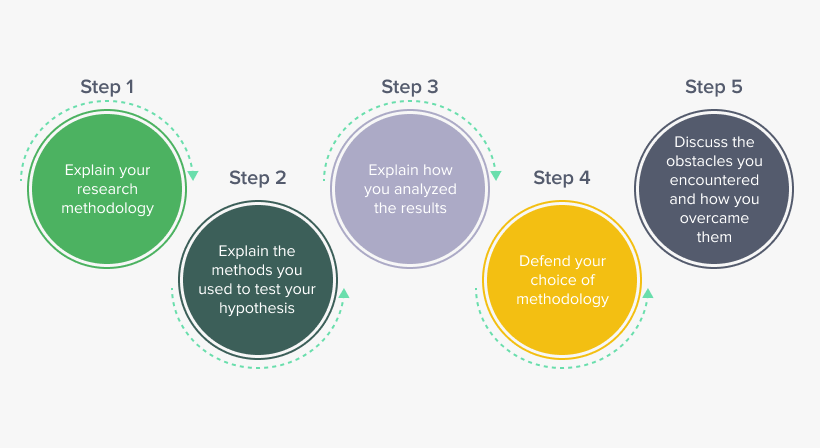Still have questions? Leave a comment

Checklist: Dissertation Proposal
Enter your email id to get the downloadable right in your inbox!

Examples: Edited Papers
Enter your email id to get the downloadable right in your inbox!
Need
Editing and
Proofreading Services?

Research Methodology Guide: Writing Tips, Types, & Examples
 Mar 19, 2024
Mar 19, 2024 7
min read
7
min read
- Tags: Academic Research, Research
No dissertation or research paper is complete without the research methodology section. Since this is the chapter where you explain how you carried out your research, this is where all the meat is! Here’s where you clearly lay out the steps you have taken to test your hypothesis or research problem.
Through this blog, we’ll unravel the complexities and meaning of research methodology in academic writing, from its fundamental principles and ethics to the diverse types of research methodology in use today. Alongside offering research methodology examples, we aim to guide you on how to write research methodology, ensuring your research endeavors are both impactful and impeccably grounded!
Let’s first take a closer look at a simple research methodology definition:
Defining what is research methodology
Research methodology is the set of procedures and techniques used to collect, analyze, and interpret data to understand and solve a research problem. Methodology in research not only includes the design and methods but also the basic principles that guide the choice of specific methods.
Grasping the concept of methodology in research is essential for students and scholars, as it demonstrates the thorough and structured method used to explore a hypothesis or research question. Understanding the definition of methodology in research aids in identifying the methods used to collect data. Be it through any type of research method approach, ensuring adherence to the proper research paper format is crucial.
Now let’s explore some research methodology types:
Types of research methodology
1. Qualitative research methodology
Qualitative research methodology is aimed at understanding concepts, thoughts, or experiences. This approach is descriptive and is often utilized to gather in-depth insights into people’s attitudes, behaviors, or cultures. Qualitative research methodology involves methods like interviews, focus groups, and observation. The strength of this methodology lies in its ability to provide contextual richness.
2. Quantitative research methodology
Quantitative research methodology, on the other hand, is focused on quantifying the problem by generating numerical data or data that can be transformed into usable statistics. It uses measurable data to formulate facts and uncover patterns in research. Quantitative research methodology typically involves surveys, experiments, or statistical analysis. This methodology is appreciated for its ability to produce objective results that are generalizable to a larger population.
3. Mixed-Methods research methodology
Mixed-methods research combines both qualitative and quantitative research methodologies to provide a more comprehensive understanding of the research problem. This approach leverages the strengths of both methodologies to provide a deeper insight into the research question of a research paper.
Research methodology vs. research methods
The research methodology or design is the overall strategy and rationale that you used to carry out the research. Whereas, research methods are the specific tools and processes you use to gather and understand the data you need to test your hypothesis.
Research methodology examples and application
To further understand research methodology, let’s explore some examples of research methodology:
a. Qualitative research methodology example: A study exploring the impact of author branding on author popularity might utilize in-depth interviews to gather personal experiences and perspectives.
b. Quantitative research methodology example: A research project investigating the effects of a book promotion technique on book sales could employ a statistical analysis of profit margins and sales before and after the implementation of the method.
c. Mixed-Methods research methodology example: A study examining the relationship between social media use and academic performance might combine both qualitative and quantitative approaches. It could include surveys to quantitatively assess the frequency of social media usage and its correlation with grades, alongside focus groups or interviews to qualitatively explore students’ perceptions and experiences regarding how social media affects their study habits and academic engagement.
These examples highlight the meaning of methodology in research and how it guides the research process, from data collection to analysis, ensuring the study’s objectives are met efficiently.
Importance of methodology in research papers
When it comes to writing your study, the methodology in research papers or a dissertation plays a pivotal role. A well-crafted methodology section of a research paper or thesis not only enhances the credibility of your research but also provides a roadmap for others to replicate or build upon your work.
How to structure the research methods chapter
Wondering how to write the research methodology section? Follow these steps to create a strong methods chapter:

Step 1: Explain your research methodology
At the start of a research paper, you would have provided the background of your research and stated your hypothesis or research problem. In this section, you will elaborate on your research strategy.
Begin by restating your research question and proceed to explain what type of research you opted for to test it. Depending on your research, here are some questions you can consider:
a. Did you use qualitative or quantitative data to test the hypothesis?
b. Did you perform an experiment where you collected data or are you writing a dissertation that is descriptive/theoretical without data collection?
c. Did you use primary data that you collected or analyze secondary research data or existing data as part of your study?
These questions will help you establish the rationale for your study on a broader level, which you will follow by elaborating on the specific methods you used to collect and understand your data.
Step 2: Explain the methods you used to test your hypothesis
Now that you have told your reader what type of research you’ve undertaken for the dissertation, it’s time to dig into specifics. State what specific methods you used and explain the conditions and variables involved. Explain what the theoretical framework behind the method was, what samples you used for testing it, and what tools and materials you used to collect the data.
Step 3: Explain how you analyzed the results
Once you have explained the data collection process, explain how you analyzed and studied the data. Here, your focus is simply to explain the methods of analysis rather than the results of the study.
Here are some questions you can answer at this stage:
a. What tools or software did you use to analyze your results?
b. What parameters or variables did you consider while understanding and studying the data you’ve collected?
c. Was your analysis based on a theoretical framework?
Your mode of analysis will change depending on whether you used a quantitative or qualitative research methodology in your study. If you’re working within the hard sciences or physical sciences, you are likely to use a quantitative research methodology (relying on numbers and hard data). If you’re doing a qualitative study, in the social sciences or humanities, your analysis may rely on understanding language and socio-political contexts around your topic. This is why it’s important to establish what kind of study you’re undertaking at the onset.
Step 4: Defend your choice of methodology
Now that you have gone through your research process in detail, you’ll also have to make a case for it. Justify your choice of methodology and methods, explaining why it is the best choice for your research question. This is especially important if you have chosen an unconventional approach or you’ve simply chosen to study an existing research problem from a different perspective. Compare it with other methodologies, especially ones attempted by previous researchers, and discuss what contributions using your methodology makes.
Step 5: Discuss the obstacles you encountered and how you overcame them
No matter how thorough a methodology is, it doesn’t come without its hurdles. This is a natural part of scientific research that is important to document so that your peers and future researchers are aware of it. Writing in a research paper about this aspect of your research process also tells your evaluator that you have actively worked to overcome the pitfalls that came your way and you have refined the research process.
Tips to write an effective methodology chapter
1. Remember who you are writing for. Keeping sight of the reader/evaluator will help you know what to elaborate on and what information they are already likely to have. You’re condensing months’ work of research in just a few pages, so you should omit basic definitions and information about general phenomena people already know.
2. Do not give an overly elaborate explanation of every single condition in your study.
3. Skip details and findings irrelevant to the results.
4. Cite references that back your claim and choice of methodology.
5. Consistently emphasize the relationship between your research question and the methodology you adopted to study it.
To sum it up, what is methodology in research? It’s the blueprint of your research, essential for ensuring that your study is systematic, rigorous, and credible. Whether your focus is on qualitative research methodology, quantitative research methodology, or a combination of both, understanding and clearly defining your methodology is key to the success of your research.
Once you write the research methodology and complete writing the entire research paper, the next step is to edit your paper. As experts in research paper editing and proofreading services, we’d love to help you perfect your paper!
Here are some other articles that you might find useful:







This is very simplified and direct. Very helpful to understand the research methodology section of a dissertation